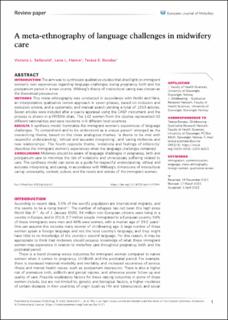| dc.contributor.author | Lerbrekk Sellevold, Victoria | |
| dc.contributor.author | Hamre, Lene Lene | |
| dc.contributor.author | Bondas, Terese Elisabet | |
| dc.date.accessioned | 2023-01-04T10:23:48Z | |
| dc.date.available | 2023-01-04T10:23:48Z | |
| dc.date.created | 2022-08-22T14:52:39Z | |
| dc.date.issued | 2022 | |
| dc.identifier.citation | Sellevold, V. L., Hamre, L. L., & Bondas, T. E. (2022). A meta-ethnography of language challenges in midwifery care. European Journal of Midwifery, 6. | en_US |
| dc.identifier.issn | 2585-2906 | |
| dc.identifier.uri | https://hdl.handle.net/11250/3040862 | |
| dc.description.abstract | Introduction:
The aim was to synthesize qualitative studies that shed light on immigrant women’s own experiences regarding language challenges during pregnancy, birth and the postpartum period in a new country. Wikberg’s theory of intercultural caring was chosen as the theoretical perspective.
Methods:
This meta-ethnography was conducted in accordance with Noblit and Hare, an interpretative qualitative review approach in seven phases, based on inclusion and exclusion criteria, and a systematic and manual search yielding a total of 1253 articles. Seven articles were included after a quality appraisal using the CASP instrument, and the process is shown in a PRISMA chart. The 142 women from the studies represented 42 different nationalities and were residents in 6 different host countries.
Results:
A synthesis model illuminates the immigrant women’s experiences of language challenges. ‘To comprehend and to be understood as a unique person’ emerged as the overarching theme, based on the three analogous themes: ‘a desire to be met with respectful understanding’, ‘ethical and accurate interpreting’, and ‘caring midwives and new relationships'. The fourth opposite theme, ‘violations and feelings of inferiority’ describes the immigrant women’s experiences when the language challenges remained.
Conclusions:
Midwives should be aware of language challenges in pregnancy, birth and postpartum care to minimize the risk of violations and unnecessary suffering related to care. The synthesis model can serve as a guide for respectful understanding, ethical and accurate interpreting, and caring, in accordance with Wikberg’s dimensions of intercultural caring: universality, context, culture, and the needs and wishes of the immigrant women. | en_US |
| dc.language.iso | eng | en_US |
| dc.publisher | European Publishing | en_US |
| dc.rights | Navngivelse 4.0 Internasjonal | * |
| dc.rights.uri | http://creativecommons.org/licenses/by/4.0/deed.no | * |
| dc.title | A meta-ethnography of language challenges in midwifery care | en_US |
| dc.title.alternative | A meta-ethnography of language challenges in midwifery care | en_US |
| dc.type | Peer reviewed | en_US |
| dc.type | Journal article | en_US |
| dc.description.version | publishedVersion | en_US |
| dc.rights.holder | The author | en_US |
| dc.subject.nsi | VDP::Medisinske Fag: 700 | en_US |
| dc.source.volume | 6 | en_US |
| dc.source.journal | European Journal of Midwifery | en_US |
| dc.identifier.doi | 10.18332/ejm/147994 | |
| dc.identifier.cristin | 2045016 | |
| cristin.ispublished | true | |
| cristin.fulltext | original | |
| cristin.qualitycode | 1 | |

